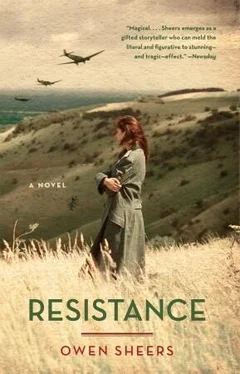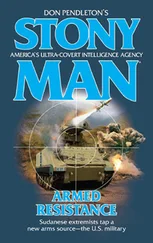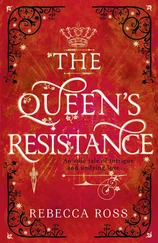And yet this is what the handbook would have them believe. This is what Maggie would have them believe, and that’s why they’d agreed to tell no one about this. No one. If their husbands had kept this secret from them, their wives, then they must keep that secret too. Until the men returned they’d say nothing of their going. They’d stay in the valley and keep the farms running. There was no need to leave. Between them there was plenty of food. Maggie’s cows produced enough milk for butter and cheese for all of them. The potatoes were newly dug and the Ministry hadn’t yet collected their share. They had enough salted pork and bacon hanging in their larders to see them through the winter. Some lamb too. It would still be hard work though. Impossible, maybe, to keep all the farms going as they should, to manage the flocks. Maggie, ever the organiser, was already working out a routine, a weekly diary of mutual help. But that was nothing new. The valley had always run on a basis of cooperation. Everyone gathered one another’s hay, picked one another’s potatoes. William lent his tractor whenever it was needed. Tools, implements, horses, ploughs, all of them were shared. The only difference now was that it was just the women who were left to handle them. But still, everything would be shared. The work and the results of the work, everything. At least, everything that could be. This, this returning to empty homes, was something each of the women had to experience alone. The sitting in quiet rooms that were somehow quieter than yesterday when they knew their husbands were out in the fields. Turning your head to catch the shadow of a movement and finding nothing, again. The intimate silences of their loss, each unique and individual, shaped by the man who had gone, these each woman suffered alone. But it was best to go to their homes, that is what they’d decided. In case the men came back. In case they left a message. It was best to be there, where the men could find them.
For Sarah that first day ended as it began. All the way back up the track to Upper Blaen, she heard the dogs and their chains. Scenting her approach they’d come out of their shelter and were straining on them again, pulling and barking, taut with unspent energy. As she came back into the yard they let the chains slacken and sat back on their haunches, nudging the air with their noses.
“Hello, girls,” Sarah said.
When she let them off they spun and turned about her, slick and supple as two freshly landed fish.
Unsure what else to do, Sarah bridled Bess the pony in the back paddock and rode out bareback to check on the flock. She also wanted to look on the hill again. She was sure there’d be some kind of a sign up there, that Tom couldn’t have left without making some kind of mark indicating where he’d gone. She took Fly and Seren with her, weaving ahead of the pony, trotting back now and then, their heads low. She wanted them for the company but she also thought there was the chance they’d pick up Tom’s scent and somehow lead her to him.
Halfway up the slope Sarah eased Bess to a halt and turned to look back down the long V of the valley. If she were to follow her mother’s description of the Black Mountains Hand, then where she rode now was in the hollow between the thumb and forefinger. The Hatterall ridge, on her right, was the forefinger, a long slice of land pointing southeast towards Pandy with Offa’s Dyke running the length of its knuckles. The Black Hill, meanwhile, or Crib Y Gath, The Cat’s Back, as her mother would have called it, was the thumb; shorter, thicker, the last bulk of earth before Herefordshire’s patchwork of farmland. Between the thumb and the forefinger ran the river Olchon, after which the valley was named.
Just like a thumb, the Black Hill opened at a wider angle than the other hills, making the valley broader at its mouth. From where Sarah was sitting, this gave it the illusion of accessibility, a stadium view right down to the distant hill islands of Skirrid Fawr and Mynydd Merddin, rising from the lowland fields. Viewed from this lowland, however, Sarah knew the Olchon actually appeared more secluded, more secretive than the other valleys. There was something about the severity of its slopes, as if a cleaver had been driven into the soil and wrenched out with no movement from side to side. And the roads. The roads didn’t turn here naturally, warded off by the depth of the valley’s shadow. The one lane that did pass around its long bowl petered out into a track and doubled back on itself just below their farm as if retreating at the last moment from the hill in its path. No one ever came into the valley by accident. You only ever came here if you needed to, and apart from those who lived here few people ever did.
Sarah moved into the valley herself four years ago when Tom brought her to live with him at Upper Blaen, his late uncle’s farm.
“The last valley in Wales,” her mother had said the evening before their wedding. “You’ll be living in the last valley in Wales, bach.” She’d shaken her head, her eyes glazed with tears, enjoying the small drama of the moment.
“More like the first in England,” her father had retorted from behind his paper. “May as well live in Hereford itself as in the Olchon.”
Her parents had spoken as if she were to travel across the country, and yet the next evening Tom only had to drive the pony and trap from Llanthony around the tip of the Hatterall ridge’s forefinger to bring his new bride home.
It was Sarah’s first move. She’d been born in the Llanthony valley and lived there all her life. She’d gone to school in the valley, had her first kiss there, known her first death there. It was even where she’d courted Tom, taking long walks with him along its upper slopes. Llanthony was where her life was shaped and where she’d come to terms with its boundaries and borders. Her mother had been born in the valley further west again between the middle finger of Tal Y Cefn and Gadir Fawr, while her grandmother was born outside the hand altogether at a farm beside Llangorse Lake, beyond Allt Mawr. Generation by generation the women of the family had moved eastward. Like pieces of driftwood floated loose from a shipwreck, they’d been drawn towards the shallower waters of the English plain. It was a journey Sarah could trace on the inside cover of her family Bible. Along with their birth, marriage, and death dates, all of her mother’s family were there, a copperplate roll call with spots of ink dotting the facing page where the book had been closed too soon after writing. It was these names that told the story of her family’s eastward movement. From the Welsh names of her ancestors, drawn from the myths of the Mabinogion: Branwen, Olwen, and Rhiannon, to her grandmother’s Megan, her mother’s Ruth, and finally her own Sarah. With each new wave hill that rolled them nearer England, with each man that took them east, their names were smoothed in the wash of the tide. The Mabinogion was replaced by the Bible and the ornate Welsh was rounded and buffed to the simpler shapes of English.
Every name in the Bible above Sarah’s and those of her two older brothers was matched with a complete set of dates. Some of them were pitifully similar, with only one or maybe two different numbers to set their years apart. Others, like those next to the sister she’d never known, were echoed by the same year altogether:
Mary Lewis, April 13, 1916–May 10, 1916
Sarah’s was the last birth date on the page.
Sarah Lewis, March 15, 1918–
She’d often looked at that dash leading nowhere and wondered who would write the pairing date. Whose hand at some moment in the future would pick up the pen and seal her life with carefully written numbers.
Gathering up the reins Sarah gave Bess a tap with her heels and began riding on up the slope towards the rest of the flock, scattered about the rocky crevice of the river and over the higher ground. Three hundred hefted ewes, yearlings to wethers, their inherited borders instinctively wired within them, passed on over the generations from mother to lamb.
Читать дальше












